Dopamine levels and the ability to learn from their mistakes
 Bashny.Net
Bashny.Net
Each of us are faced with the same problem, when we find it difficult to admit their own mistakes, it is difficult to learn from mistakes, so you are constantly stepping on the same rake.
The ability to learn from experience — the most useful adaptation that allows humans and animals to change their behavior depending on circumstances. Completely innate, not dependent on learning behavioral responses is good only in case if the same decision in a standard situation is always optimal.
Dopamine and prefrontal systems are closely linked. It is not surprising that dopamine plays an important role in memory processes. We love to look for connections between events and this is not surprising – it is a human characteristic helped to survive our ancestors.
Dopamine neurons are programmed to look for causation, but sometimes they find a sequence where it actually not. We may have two types of errors: a type I error — false positive (an excess of dopamine) and the second type of error is the omission of events (with a lack of dopamine).
Dopamine addicts and patients with Parkinson's disease who are sitting on dopamine agonists, often become avid players (or obsessed with some idea). Their brain thinks he's found the formula for winning, the dopamine is off the charts, money melt away. This is a mistake of the first type is a false positive. Or, for example, a person overeats and gains weight. When he said that you need to eat less, he just nods, but continues to eat. Why? This is the second type of error - skipping events, the person does not learn from his experience, such errors are typical for a low level of dopamine.
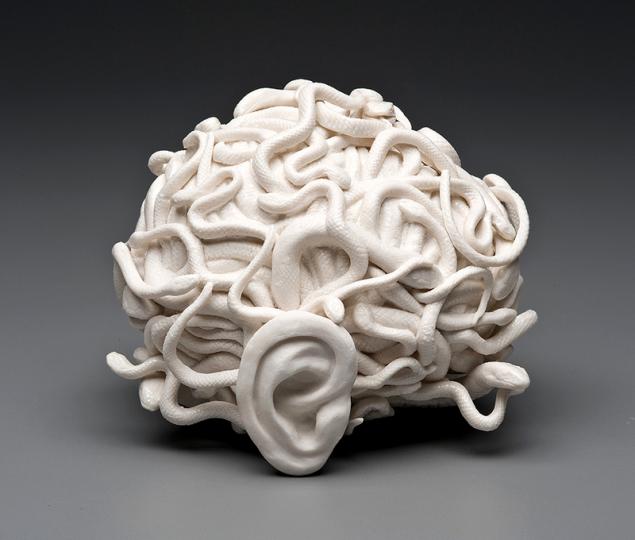
©Kate MacDowell
Dopamine and the ability to learn from experience: dopamine whip.
In the 70s research and extensive analysis of the physiological role of nigrostriatal dopaminergic system showed that the management of psychomotor processes at the level of the striatum is linked closely with the metabolism of dopamine. Data were obtained indicating a significant role in brain activity of the ascending mesocortical dopaminergic projections.
According to the conventional on the moment the point of view, mesolimbic and mesocortical systems are involved in the mechanisms of memory and learning. The prefrontal cortex processes information on the principle of "signal to noise" by suppressing the noise and amplifying the signal and in so doing, it helps dopamine (highlighting the most important with emotion). Dopamine changes the ratio signal/noise in the perceived information. That is how accurate we are in defining images.
If you're wrong, the level of dopamine falls. And this drop makes you feel worse and to take to rectify the situation. If dopamine after a mistake did not fall, then this error you have not learned anything. In other words, with high sensitivity to dopamine, while reducing its allocation of well-being will sharply decrease, which will make in the future to avoid similar problems or, more simply, he always learns from his mistakes. If the release of dopamine receptors have low sensitivity, while his health to decline much less and training will not happen (like, well, wrong — nothing! stay positive! =)).
Scientists believe that at low concentrations of dopamine (receptor sensitivity) is much worse than people can use the experience of their mistakes and rarely make the right conclusions. Front lumbar cortex (ACC) involved in determining the errors. ACC helps to provide a link between what we know and what we feel. It also helps remember what the dopamine cells have just learned to quickly adapt expectations to the new conditions.
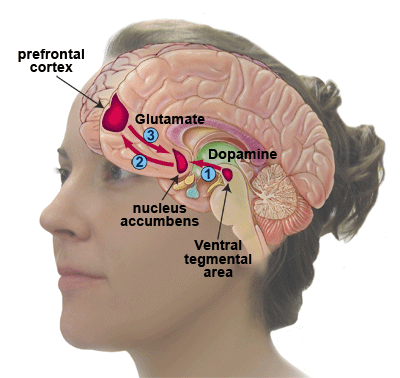
The ventral tegmental area (ventral tegmental area, VTA) is a key component of the "reward system" (also known as "internal reinforcement") in the brain of mammals. Approximately 55-65% of VTA neurons is dopamine (dopamine-mediated error) a neurons that transmit signals to other neurons by using the neurotransmitter dopamine. Dopamine plays in the brain as "substances of pleasure".
Dopamine signals from the VTA received in the prefrontal cortex, where conscious mental processes in the hippocampus, managing remembering (this may be due to the training on the positive experience), nucleus accumbens (nucleus accumbens), which can be called "the main pleasure center" and which is responsible for motivation, attachment and dependence, and other "emotional" parts of the brain such as the amygdala (amygdala).
Dopamine neurons of the VTA are activated in response to positive incentives (which they get from other parts of the brain, including cortex) and the conditional stimuli promising reward. For example, if the animal knows that after the beep, give him something delicious, VTA dopamine neurons are excited in response to the audio signal.
The award (the"unconditioned stimulus") activates them according to their predictability: an unexpected reward causes strong activation, but if the animal knows that the treat always appears after the call, the neuron vigorously will only respond to the call, and the award itself will react weaker or no reaction at all.
Well, if after the call, put the reward does not appear, the activity of VTA dopamine neurons display a disappointment, falling below the baseline ("calm") level (error, dopamine whip). If we're wrong, then the brain receives dopamine, "tickling" the pleasure centers that most people have triggers activation of D2 receptors and forces them to commit such actions. Moreover, it records the error information in the memory reliably.
Thus, these neurons encode not good news as such, but rather the degree of their conformity to expectations, "the prediction error of reward" (reward prediction error, RPE). This mechanism prevents us from enjoying the usual, standard achievements, but does not prevent to be upset when the expected reward is suddenly slipping from the hands.
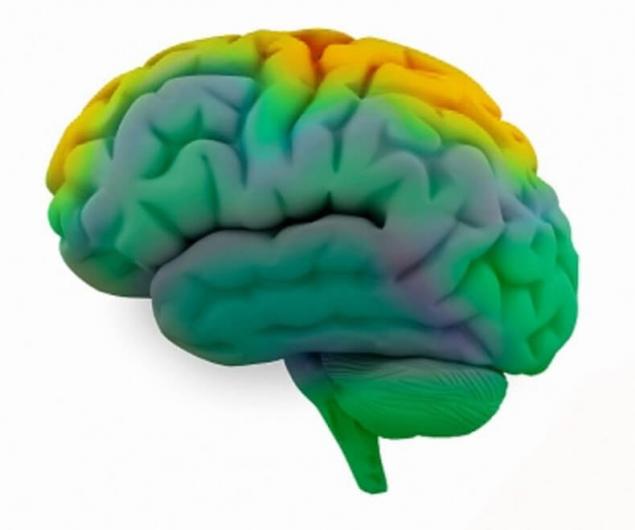
Two types of errors, and dopamine levels.
As we've discussed, our brain loves to look for causal relationships. This process is called "stereotyping", it has a tendency to look for patterns everywhere — and where they are, and meaningless noise. In the process of the search may be two types of errors: a type I error — a false positive and the second type of error — skipping events.
A type I error — a false positive. This is when we believe that a pattern exists when in fact it is not. This includes different superstitions, illusions and self-deception. People with high dopamine sees conspiracies everywhere, he sees different ideas and illusion. Too high and maybe you see patterns everywhere. Every time somebody looks at you, he feels that people are staring. It seems that people are talking about. And if he goes too far on that, that's just called crazy.
The second type of error — skipping events. The second type of error is a denial of the real existing pattern. This is when you are doing something wrong, for example, overeat, but your emotional brain can't take it for the cause of your excess weight. The increase in the number of errors of the second kind occurs when a reduced level of dopamine. Dopamine changes the ratio signal/noise in the perceived information. That is how accurate we are in defining images. If it's too low, you're more likely to make a lot of errors of the second kind. You miss the real patterns. You don't want to be too skeptical. If you're too skeptical, you'll miss the really interesting good ideas.
The thing is that stereotyping occurs only when the price of committing errors of the first kind less than the cost of making errors of the second kind. The definition of the behavior pattern — assessment of the difference between the error of the first and the second kind is an extremely difficult task especially when the decision should take a moment, in situations in which the question of life and death. Humans evolved the tendency to believe, for those whose brain looking for hard matching, so I always cross reference and associate them with any predatory or intentional agencies on the other hand (fans of conspiracy)
Error of the first type.
A type I error — a false positive. This is when we believe that a pattern exists when in fact it is not. This includes different superstitions, illusions and self-deception. With the increased level of dopamine the person is often wrong, giving the event the ability to act. This is a trend to endow images with meaning, but also the ability to directional action. This error is often applied to invisible beings from the top and a false understanding of reality.
Alternatively this process can be called a granting of ability to act like an event, an object or a person acting with a kind of its purpose. It's called intentional installation (intentional stance) — we consider the actions of others and their own as if they had a purpose, a focus, as it helps to interpret them.
Similarly we can take the intentional stance to animals or inanimate objects (the car hates me). This is not the only position we can take. Design stance (project position) — the axe is made to chop. Physical stance (Physikalische setting) — the object in question as being subject to the laws of physics. None of them is more correct or less correct.
Intentional installation is this strategy of interpreting the behavior of an object (person, animal, artifact, whatever) when it is perceived as if it were a rational agent who is in the "choice" of "action" is guided by their "beliefs" and "desires".
These terms are in quotes (used here loosely) borrowed from what is usually called "folk psychology", i.e., everyday psychological discourse, in which we are involved, discussing the mental life of our fellow men. Intentional installation is a position or point of view, which we usually takes in relation to each other, so the choice is intentional on attitudes to anything else seems to be conscious would be anthropomorphizing.
For example, we apply this setting to the alarm clock. Alarm clock is my servant; if I order him to Wake me up, letting him know what time you need to do this, I can rely on the inherent to sposobnostyami when that time came, and responsibly deliver on the promised action.
As he sees that now is the time to call, he will be "motif", due to my previous instructions to act accordingly. Without a doubt, the alarm clock is so simple that we don't need, strictly speaking, this fanciful anthropomorphism to understanding why he does what he does, but notice that we can explain to the child how to use an alarm clock: "You tell him when you want him waking you up, it remembers it and wakes you with a loud bell."
The choice is intentional setup more useful – indeed, almost mandatory – when the artifact is much more complicated alarm clock. Of course, at the household level, this setup makes it easier to understand, but in extreme cases gives rise to many errors.
Examples of errors of the first type: plots, omens, religion, etc. At the household level: the machine is specially broken to annoy me, he specially made me worse. Hence, there are different conspiracy theories and empty illusory dreams about a meaning of life, about a wizard in a helicopter, a government that will save us, aliens and so on. When high levels of dopamine, the person falls into the illusion and makes lots of errors of the first type.
It is worth noting that people have feelings of uncertainty and uncontrollability is encouraging to see the illusory conformity (self-deception). People are placed in conditions where they feel not in control are more likely to see something here, where nothing is ordered there. In other words, the propensity to find these patterns increases with uncontrollable life situations.
For example, it is well known that baseball players behave "superstitious" when they are served and this behavior weakens when a player in the field. Because fielders are successful 90 to 95 percent of the time. The best batters fail seven times out of ten. So all of their stereotypicalness and Ghost fear arises in uncontrolled situations and other similar cases.
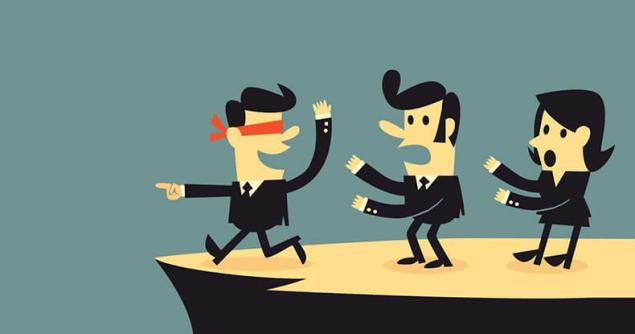
Those who do not learn from the mistakes (errors of the second type)
A new study identified the genetic mutation that dooms its unfortunate owners to a new and a new repetition of the painful experience. It is a genetic disorder leads to a decrease in the number of receptors of type D2, which must be activated in cases where in the brain dramatically reduced the content of dopamine. The carriers of this mutation, the number of dopamine D2 receptors is reduced by about 30%. There is a relationship between the density of D2 receptors in the basal ganglia and learning. The evolutionary old part of the basal ganglia — the limbic striatum is involved in implicit learning.
It is known that people who have on the surface of brain cells reduced the number of dopamine receptors of a particular type (D2), often become alcoholics and drug addicts. It was thought that the lack of positive emotions. German scientists have discovered that there is another communication mechanism. It turned out that humans carry a mutation that reduces the number of D2 receptors on the surface of neurons, have reduced ability to learn from their mistakes.
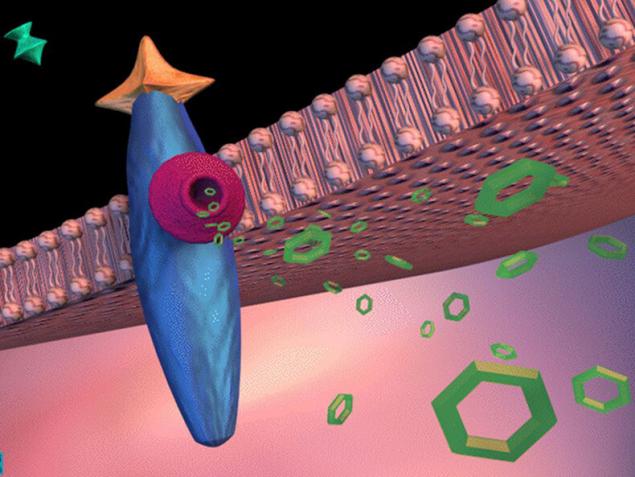
For example, it is known that mutations leading to a decrease in the number of dopamine receptors of the second type (D2) in certain areas of the brain, leading to impulsive behavior and increase the risk of developing drug or alcohol addiction. In addition, people with a reduced number of D2 receptors more likely to be obese (as prone to gluttony), often become slaves to other harmful or dangerous habits (such as gambling). It must be remembered that it is not about rigid genetic determinism a type of behavior, but only about certain trends.
German neuroscientists have hypothesized that perhaps a lack of dopamine receptors reduces the ability of people to learn from their mistakes, that is, to draw the right conclusions from a negative experience and not repeat the actions that led to bad consequences.
In General, the obtained results indicate that the normal operation of dopamine systems of the brain necessary for a person to be able to effectively learn from their mistakes. Disruption of dopamine neurons (e.g., due to lack of dopamine receptors, as the carriers of allele A1) may lead to the neglect of negative experiences. People simply stop responding to the negative consequences of their actions and therefore can repeatedly step on the same rake.
These studies should show how the brain programs the addiction, addictions and irresistible cravings for certain acts about which later regret. The brains of people suffering from attachment to drugs and alcohol, it ignores the mechanism of learning from mistakes. He receives only the pulses to the pleasure centers associated with drug euphoria or winnings at the card table, however, is not able to perceive negative consequences.
"My experience is the child of hard mistakes"
A well-functioning dopamine system is wisdom, in contrast to the "intellectual". The conscious brain (prefrontal cortex) ignorant about their own foundations and blind to all the neural activity taking place outside the prefrontal cortex. Therefore, it is important to us emotions: this is the inside view of all the information that we process but do not recognize (misses the prefrontal cortex for different reasons).
For most of human history, the value of emotions was underestimated because they were difficult to analyze — they had no reasons, excuses or explanations. Thanks to the tools of modern neuroscience, we can see that emotions have their own logic. Fluctuations of dopamine help keep track of reality, alerting us about all the implicit patterns that we are not able to consciously detect.
Emotional dopamine system, the brain is particularly useful when we are taking difficult decisions. Its enormous processing power — the ability to simultaneously process millions of pieces of information ensures that, in assessing different options you will be able to analyze all the relevant data. Puzzles are split up into simpler elements that are easier to operate, and then they are translated into practical feelings.
These emotions are so reasonable because we have learned to learn from our mistakes. You are constantly benefiting from experience, even if you are not consciously aware of this report. No matter what you specializiruetsya, the brain always learns the same way, accumulating wisdom through error. This painstaking process can we reduce or optimize: to become an expert requires time and practice.
However, once you have gained some experience in a certain area, having made the necessary mistakes, it is important to start trusting your emotions in the decision-making process in this area. In the end, it is the feelings (the dopamine system) and not the prefrontal cortex, possess the wisdom of experience. These subtle signals that we get from the brain, indicate that our brains have learned to understand the situation. He learned to analyse practical aspects of the surrounding world so that you understand what to do. Over-analysing these expert solutions ("sophistry"), you paralyze your ability to act.
This does not mean that we should always trust the emotional thinking. Sometimes it is impulsive and short-sighted. Sometimes it can be overly sensitive to patterns and stereotypes (which is why people lose so much money on the slot machines). However, it is always useful to take your emotions into consideration: to think about why you feel what you feel. In other words, act like a marketer, carefully analyze the reactions of the focus group. Even if you decided to ignore your emotions, they still remain a valuable source of data.
Dopamine and food.
So, for example, there is a decrease in the activity of D2 receptors in patients with obesity. Similar changes of signal transmission of dopamine was observed in drug-dependent individuals. In studies in rats confirmed the similarity of compulsive overeating with the action of drugs on dopaminergic transmission in the brain. A negative feedback weight and the number of D2-receptors of hypothalamus in rats.
Because dopamine is responsible for motivation and reward, the consumption of delicious food causes its release from neurons in the hypothalamus in humans and animals. A subjective rating of satiety food correlates with the concentration of dopamine. It is established that some constituents of food (e.g., sugar, corn oil) to a greater extent compared to other foods that stimulate its release.
According to G.-W. Wang, feeding rats sugar-containing fluids causes an increase in dopamine concentration similar to its values in animals that are dependent on drugs. The historical aspects that I discussed in the article about gluttony (and why gluttony is historically a mortal sin).
Overeating, stimulating themselves with food leads to disruption of the dopamine system even in the absence of any genetic predisposition. The role of obesity in disorders of the dopamine Transporter (DT) that transports dopamine and plays an important role in maintaining it. It is established that insulin affects its functioning.
Insulin receptors are expressed on dopamine neurons in the ventral tegmental area of the hypothalamus. Increased levels of insulin lower values of dopamine in the ventral tegmental area of the hypothalamus by reducing the levels of selective inhibitor of DT. Observed negative relationship of the indicators DT and BMI. Revealed that the levels of DT were less in mice under high calorie diet. According to N. Speed, in rats with alimentary obesity the decrease dopamine reuptake.
Revealed dose-dependent decrease in dopamine reuptake in rats with the consumption of foods containing large amounts of fat. Installed effect of fatty food on DT, even in the absence of obesity.

Conclusion.
The biggest risk dopamine depletion that decrease the level of dopamine leads to the fact that we no longer learn from their mistakes. Formally, we can accept that you are doing wrong (prefrontal cortex), but this recognition will not lead to a change in our behavior. Restoration of sensitivity of dopamine neurons is an important component of the work. After all, if you can't learn from their actions, what's the point of doing anything? You are doomed to constantly step on the same rake.
To destroy their receptors are very simple, moreover, decreases with age the number and density of dopamine D2 receptors of the striatum, therefore, older and old people do the same thing, not learning from their mistakes. It is the D2 receptor restored the worst. Therefore, any dependencies, and drugs lead to a decrease in dopamine D2 receptors.
There are a number of factors: for example lack of sleep. Did you notice that if we are alone for a long time can not sleep, it will soon begin to feel the effects: our scattered attention, we can throw that in heat, in cold, we can do strange things, say strange things...
In an article published in the Journal of Neuroscience, the authors write that a lack of sleep led to a sharp decrease in dopamine receptor. But it had nothing to do with changes in the level of neurotransmitter. The researchers tried to stimulate the release of dopamine with the help of ritalin.
Interesting facts about nagyhatalmak functions of the respiratory system
Fibroids — resentment, cyst — jealousy
Dopamine levels were raised, but no difference from sleeping and not sleeping was not. The same was observed with laboratory rats in which the level of the neurotransmitter and its receptor were measured directly: increased waking hours reduced the level of the receptor, but does not affect the content of dopamine.
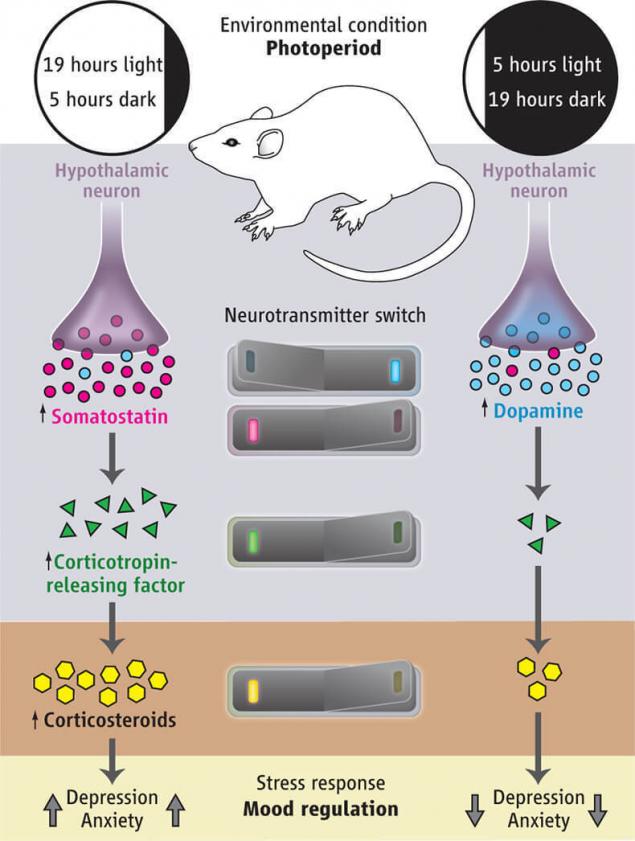
Antipsychotic drugs that cause lethargy and sleepiness, just block the dopamine receptor D2. Moreover, the decrease in the content of D2 was observed in sleep deprivation. That is the conclusion: the longer we are awake, the more we will experience dopamine and less of its receptor. There is no contradiction here. Biochemists have long known that if you prestimulate receptor, on the cell bring down a waterfall of molecules, stimuli, the number of receptor molecules is sharply reduced: they leave the membrane making it less sensitive.published
Author: Andrey Blueskin
Source: www.beloveshkin.com/2016/09/uroven-dofamina-i-sposobnost-uchitsya-na-svoikh-oshibkakh.html
The ability to learn from experience — the most useful adaptation that allows humans and animals to change their behavior depending on circumstances. Completely innate, not dependent on learning behavioral responses is good only in case if the same decision in a standard situation is always optimal.
Dopamine and prefrontal systems are closely linked. It is not surprising that dopamine plays an important role in memory processes. We love to look for connections between events and this is not surprising – it is a human characteristic helped to survive our ancestors.
Dopamine neurons are programmed to look for causation, but sometimes they find a sequence where it actually not. We may have two types of errors: a type I error — false positive (an excess of dopamine) and the second type of error is the omission of events (with a lack of dopamine).
Dopamine addicts and patients with Parkinson's disease who are sitting on dopamine agonists, often become avid players (or obsessed with some idea). Their brain thinks he's found the formula for winning, the dopamine is off the charts, money melt away. This is a mistake of the first type is a false positive. Or, for example, a person overeats and gains weight. When he said that you need to eat less, he just nods, but continues to eat. Why? This is the second type of error - skipping events, the person does not learn from his experience, such errors are typical for a low level of dopamine.

©Kate MacDowell
Dopamine and the ability to learn from experience: dopamine whip.
In the 70s research and extensive analysis of the physiological role of nigrostriatal dopaminergic system showed that the management of psychomotor processes at the level of the striatum is linked closely with the metabolism of dopamine. Data were obtained indicating a significant role in brain activity of the ascending mesocortical dopaminergic projections.
According to the conventional on the moment the point of view, mesolimbic and mesocortical systems are involved in the mechanisms of memory and learning. The prefrontal cortex processes information on the principle of "signal to noise" by suppressing the noise and amplifying the signal and in so doing, it helps dopamine (highlighting the most important with emotion). Dopamine changes the ratio signal/noise in the perceived information. That is how accurate we are in defining images.
If you're wrong, the level of dopamine falls. And this drop makes you feel worse and to take to rectify the situation. If dopamine after a mistake did not fall, then this error you have not learned anything. In other words, with high sensitivity to dopamine, while reducing its allocation of well-being will sharply decrease, which will make in the future to avoid similar problems or, more simply, he always learns from his mistakes. If the release of dopamine receptors have low sensitivity, while his health to decline much less and training will not happen (like, well, wrong — nothing! stay positive! =)).
Scientists believe that at low concentrations of dopamine (receptor sensitivity) is much worse than people can use the experience of their mistakes and rarely make the right conclusions. Front lumbar cortex (ACC) involved in determining the errors. ACC helps to provide a link between what we know and what we feel. It also helps remember what the dopamine cells have just learned to quickly adapt expectations to the new conditions.

The ventral tegmental area (ventral tegmental area, VTA) is a key component of the "reward system" (also known as "internal reinforcement") in the brain of mammals. Approximately 55-65% of VTA neurons is dopamine (dopamine-mediated error) a neurons that transmit signals to other neurons by using the neurotransmitter dopamine. Dopamine plays in the brain as "substances of pleasure".
Dopamine signals from the VTA received in the prefrontal cortex, where conscious mental processes in the hippocampus, managing remembering (this may be due to the training on the positive experience), nucleus accumbens (nucleus accumbens), which can be called "the main pleasure center" and which is responsible for motivation, attachment and dependence, and other "emotional" parts of the brain such as the amygdala (amygdala).
Dopamine neurons of the VTA are activated in response to positive incentives (which they get from other parts of the brain, including cortex) and the conditional stimuli promising reward. For example, if the animal knows that after the beep, give him something delicious, VTA dopamine neurons are excited in response to the audio signal.
The award (the"unconditioned stimulus") activates them according to their predictability: an unexpected reward causes strong activation, but if the animal knows that the treat always appears after the call, the neuron vigorously will only respond to the call, and the award itself will react weaker or no reaction at all.
Well, if after the call, put the reward does not appear, the activity of VTA dopamine neurons display a disappointment, falling below the baseline ("calm") level (error, dopamine whip). If we're wrong, then the brain receives dopamine, "tickling" the pleasure centers that most people have triggers activation of D2 receptors and forces them to commit such actions. Moreover, it records the error information in the memory reliably.
Thus, these neurons encode not good news as such, but rather the degree of their conformity to expectations, "the prediction error of reward" (reward prediction error, RPE). This mechanism prevents us from enjoying the usual, standard achievements, but does not prevent to be upset when the expected reward is suddenly slipping from the hands.

Two types of errors, and dopamine levels.
As we've discussed, our brain loves to look for causal relationships. This process is called "stereotyping", it has a tendency to look for patterns everywhere — and where they are, and meaningless noise. In the process of the search may be two types of errors: a type I error — a false positive and the second type of error — skipping events.
A type I error — a false positive. This is when we believe that a pattern exists when in fact it is not. This includes different superstitions, illusions and self-deception. People with high dopamine sees conspiracies everywhere, he sees different ideas and illusion. Too high and maybe you see patterns everywhere. Every time somebody looks at you, he feels that people are staring. It seems that people are talking about. And if he goes too far on that, that's just called crazy.
The second type of error — skipping events. The second type of error is a denial of the real existing pattern. This is when you are doing something wrong, for example, overeat, but your emotional brain can't take it for the cause of your excess weight. The increase in the number of errors of the second kind occurs when a reduced level of dopamine. Dopamine changes the ratio signal/noise in the perceived information. That is how accurate we are in defining images. If it's too low, you're more likely to make a lot of errors of the second kind. You miss the real patterns. You don't want to be too skeptical. If you're too skeptical, you'll miss the really interesting good ideas.
The thing is that stereotyping occurs only when the price of committing errors of the first kind less than the cost of making errors of the second kind. The definition of the behavior pattern — assessment of the difference between the error of the first and the second kind is an extremely difficult task especially when the decision should take a moment, in situations in which the question of life and death. Humans evolved the tendency to believe, for those whose brain looking for hard matching, so I always cross reference and associate them with any predatory or intentional agencies on the other hand (fans of conspiracy)
Error of the first type.
A type I error — a false positive. This is when we believe that a pattern exists when in fact it is not. This includes different superstitions, illusions and self-deception. With the increased level of dopamine the person is often wrong, giving the event the ability to act. This is a trend to endow images with meaning, but also the ability to directional action. This error is often applied to invisible beings from the top and a false understanding of reality.
Alternatively this process can be called a granting of ability to act like an event, an object or a person acting with a kind of its purpose. It's called intentional installation (intentional stance) — we consider the actions of others and their own as if they had a purpose, a focus, as it helps to interpret them.
Similarly we can take the intentional stance to animals or inanimate objects (the car hates me). This is not the only position we can take. Design stance (project position) — the axe is made to chop. Physical stance (Physikalische setting) — the object in question as being subject to the laws of physics. None of them is more correct or less correct.
Intentional installation is this strategy of interpreting the behavior of an object (person, animal, artifact, whatever) when it is perceived as if it were a rational agent who is in the "choice" of "action" is guided by their "beliefs" and "desires".
These terms are in quotes (used here loosely) borrowed from what is usually called "folk psychology", i.e., everyday psychological discourse, in which we are involved, discussing the mental life of our fellow men. Intentional installation is a position or point of view, which we usually takes in relation to each other, so the choice is intentional on attitudes to anything else seems to be conscious would be anthropomorphizing.
For example, we apply this setting to the alarm clock. Alarm clock is my servant; if I order him to Wake me up, letting him know what time you need to do this, I can rely on the inherent to sposobnostyami when that time came, and responsibly deliver on the promised action.
As he sees that now is the time to call, he will be "motif", due to my previous instructions to act accordingly. Without a doubt, the alarm clock is so simple that we don't need, strictly speaking, this fanciful anthropomorphism to understanding why he does what he does, but notice that we can explain to the child how to use an alarm clock: "You tell him when you want him waking you up, it remembers it and wakes you with a loud bell."
The choice is intentional setup more useful – indeed, almost mandatory – when the artifact is much more complicated alarm clock. Of course, at the household level, this setup makes it easier to understand, but in extreme cases gives rise to many errors.
Examples of errors of the first type: plots, omens, religion, etc. At the household level: the machine is specially broken to annoy me, he specially made me worse. Hence, there are different conspiracy theories and empty illusory dreams about a meaning of life, about a wizard in a helicopter, a government that will save us, aliens and so on. When high levels of dopamine, the person falls into the illusion and makes lots of errors of the first type.
It is worth noting that people have feelings of uncertainty and uncontrollability is encouraging to see the illusory conformity (self-deception). People are placed in conditions where they feel not in control are more likely to see something here, where nothing is ordered there. In other words, the propensity to find these patterns increases with uncontrollable life situations.
For example, it is well known that baseball players behave "superstitious" when they are served and this behavior weakens when a player in the field. Because fielders are successful 90 to 95 percent of the time. The best batters fail seven times out of ten. So all of their stereotypicalness and Ghost fear arises in uncontrolled situations and other similar cases.

Those who do not learn from the mistakes (errors of the second type)
A new study identified the genetic mutation that dooms its unfortunate owners to a new and a new repetition of the painful experience. It is a genetic disorder leads to a decrease in the number of receptors of type D2, which must be activated in cases where in the brain dramatically reduced the content of dopamine. The carriers of this mutation, the number of dopamine D2 receptors is reduced by about 30%. There is a relationship between the density of D2 receptors in the basal ganglia and learning. The evolutionary old part of the basal ganglia — the limbic striatum is involved in implicit learning.
It is known that people who have on the surface of brain cells reduced the number of dopamine receptors of a particular type (D2), often become alcoholics and drug addicts. It was thought that the lack of positive emotions. German scientists have discovered that there is another communication mechanism. It turned out that humans carry a mutation that reduces the number of D2 receptors on the surface of neurons, have reduced ability to learn from their mistakes.

For example, it is known that mutations leading to a decrease in the number of dopamine receptors of the second type (D2) in certain areas of the brain, leading to impulsive behavior and increase the risk of developing drug or alcohol addiction. In addition, people with a reduced number of D2 receptors more likely to be obese (as prone to gluttony), often become slaves to other harmful or dangerous habits (such as gambling). It must be remembered that it is not about rigid genetic determinism a type of behavior, but only about certain trends.
German neuroscientists have hypothesized that perhaps a lack of dopamine receptors reduces the ability of people to learn from their mistakes, that is, to draw the right conclusions from a negative experience and not repeat the actions that led to bad consequences.
In General, the obtained results indicate that the normal operation of dopamine systems of the brain necessary for a person to be able to effectively learn from their mistakes. Disruption of dopamine neurons (e.g., due to lack of dopamine receptors, as the carriers of allele A1) may lead to the neglect of negative experiences. People simply stop responding to the negative consequences of their actions and therefore can repeatedly step on the same rake.
These studies should show how the brain programs the addiction, addictions and irresistible cravings for certain acts about which later regret. The brains of people suffering from attachment to drugs and alcohol, it ignores the mechanism of learning from mistakes. He receives only the pulses to the pleasure centers associated with drug euphoria or winnings at the card table, however, is not able to perceive negative consequences.
"My experience is the child of hard mistakes"
A well-functioning dopamine system is wisdom, in contrast to the "intellectual". The conscious brain (prefrontal cortex) ignorant about their own foundations and blind to all the neural activity taking place outside the prefrontal cortex. Therefore, it is important to us emotions: this is the inside view of all the information that we process but do not recognize (misses the prefrontal cortex for different reasons).
For most of human history, the value of emotions was underestimated because they were difficult to analyze — they had no reasons, excuses or explanations. Thanks to the tools of modern neuroscience, we can see that emotions have their own logic. Fluctuations of dopamine help keep track of reality, alerting us about all the implicit patterns that we are not able to consciously detect.
Emotional dopamine system, the brain is particularly useful when we are taking difficult decisions. Its enormous processing power — the ability to simultaneously process millions of pieces of information ensures that, in assessing different options you will be able to analyze all the relevant data. Puzzles are split up into simpler elements that are easier to operate, and then they are translated into practical feelings.
These emotions are so reasonable because we have learned to learn from our mistakes. You are constantly benefiting from experience, even if you are not consciously aware of this report. No matter what you specializiruetsya, the brain always learns the same way, accumulating wisdom through error. This painstaking process can we reduce or optimize: to become an expert requires time and practice.
However, once you have gained some experience in a certain area, having made the necessary mistakes, it is important to start trusting your emotions in the decision-making process in this area. In the end, it is the feelings (the dopamine system) and not the prefrontal cortex, possess the wisdom of experience. These subtle signals that we get from the brain, indicate that our brains have learned to understand the situation. He learned to analyse practical aspects of the surrounding world so that you understand what to do. Over-analysing these expert solutions ("sophistry"), you paralyze your ability to act.
This does not mean that we should always trust the emotional thinking. Sometimes it is impulsive and short-sighted. Sometimes it can be overly sensitive to patterns and stereotypes (which is why people lose so much money on the slot machines). However, it is always useful to take your emotions into consideration: to think about why you feel what you feel. In other words, act like a marketer, carefully analyze the reactions of the focus group. Even if you decided to ignore your emotions, they still remain a valuable source of data.
Dopamine and food.
So, for example, there is a decrease in the activity of D2 receptors in patients with obesity. Similar changes of signal transmission of dopamine was observed in drug-dependent individuals. In studies in rats confirmed the similarity of compulsive overeating with the action of drugs on dopaminergic transmission in the brain. A negative feedback weight and the number of D2-receptors of hypothalamus in rats.
Because dopamine is responsible for motivation and reward, the consumption of delicious food causes its release from neurons in the hypothalamus in humans and animals. A subjective rating of satiety food correlates with the concentration of dopamine. It is established that some constituents of food (e.g., sugar, corn oil) to a greater extent compared to other foods that stimulate its release.
According to G.-W. Wang, feeding rats sugar-containing fluids causes an increase in dopamine concentration similar to its values in animals that are dependent on drugs. The historical aspects that I discussed in the article about gluttony (and why gluttony is historically a mortal sin).
Overeating, stimulating themselves with food leads to disruption of the dopamine system even in the absence of any genetic predisposition. The role of obesity in disorders of the dopamine Transporter (DT) that transports dopamine and plays an important role in maintaining it. It is established that insulin affects its functioning.
Insulin receptors are expressed on dopamine neurons in the ventral tegmental area of the hypothalamus. Increased levels of insulin lower values of dopamine in the ventral tegmental area of the hypothalamus by reducing the levels of selective inhibitor of DT. Observed negative relationship of the indicators DT and BMI. Revealed that the levels of DT were less in mice under high calorie diet. According to N. Speed, in rats with alimentary obesity the decrease dopamine reuptake.
Revealed dose-dependent decrease in dopamine reuptake in rats with the consumption of foods containing large amounts of fat. Installed effect of fatty food on DT, even in the absence of obesity.

Conclusion.
The biggest risk dopamine depletion that decrease the level of dopamine leads to the fact that we no longer learn from their mistakes. Formally, we can accept that you are doing wrong (prefrontal cortex), but this recognition will not lead to a change in our behavior. Restoration of sensitivity of dopamine neurons is an important component of the work. After all, if you can't learn from their actions, what's the point of doing anything? You are doomed to constantly step on the same rake.
To destroy their receptors are very simple, moreover, decreases with age the number and density of dopamine D2 receptors of the striatum, therefore, older and old people do the same thing, not learning from their mistakes. It is the D2 receptor restored the worst. Therefore, any dependencies, and drugs lead to a decrease in dopamine D2 receptors.
There are a number of factors: for example lack of sleep. Did you notice that if we are alone for a long time can not sleep, it will soon begin to feel the effects: our scattered attention, we can throw that in heat, in cold, we can do strange things, say strange things...
In an article published in the Journal of Neuroscience, the authors write that a lack of sleep led to a sharp decrease in dopamine receptor. But it had nothing to do with changes in the level of neurotransmitter. The researchers tried to stimulate the release of dopamine with the help of ritalin.
Interesting facts about nagyhatalmak functions of the respiratory system
Fibroids — resentment, cyst — jealousy
Dopamine levels were raised, but no difference from sleeping and not sleeping was not. The same was observed with laboratory rats in which the level of the neurotransmitter and its receptor were measured directly: increased waking hours reduced the level of the receptor, but does not affect the content of dopamine.

Antipsychotic drugs that cause lethargy and sleepiness, just block the dopamine receptor D2. Moreover, the decrease in the content of D2 was observed in sleep deprivation. That is the conclusion: the longer we are awake, the more we will experience dopamine and less of its receptor. There is no contradiction here. Biochemists have long known that if you prestimulate receptor, on the cell bring down a waterfall of molecules, stimuli, the number of receptor molecules is sharply reduced: they leave the membrane making it less sensitive.published
Author: Andrey Blueskin
Source: www.beloveshkin.com/2016/09/uroven-dofamina-i-sposobnost-uchitsya-na-svoikh-oshibkakh.html
Tags
See also
Dunning-Kruger Effect: stupid person is wrong, but can not realize their mistakes due to his own stupidity
The most simple ways to effectively learn
Why be "too smart" can be bad for you
Why be "too smart" can be bad for you
How to do self-massage after a contrast shower
How to Occidente yourself and your life
The law of attraction: 30 ways you can attract what you dream of
How to sell your business?
















